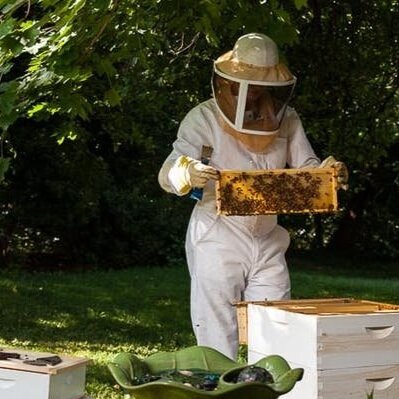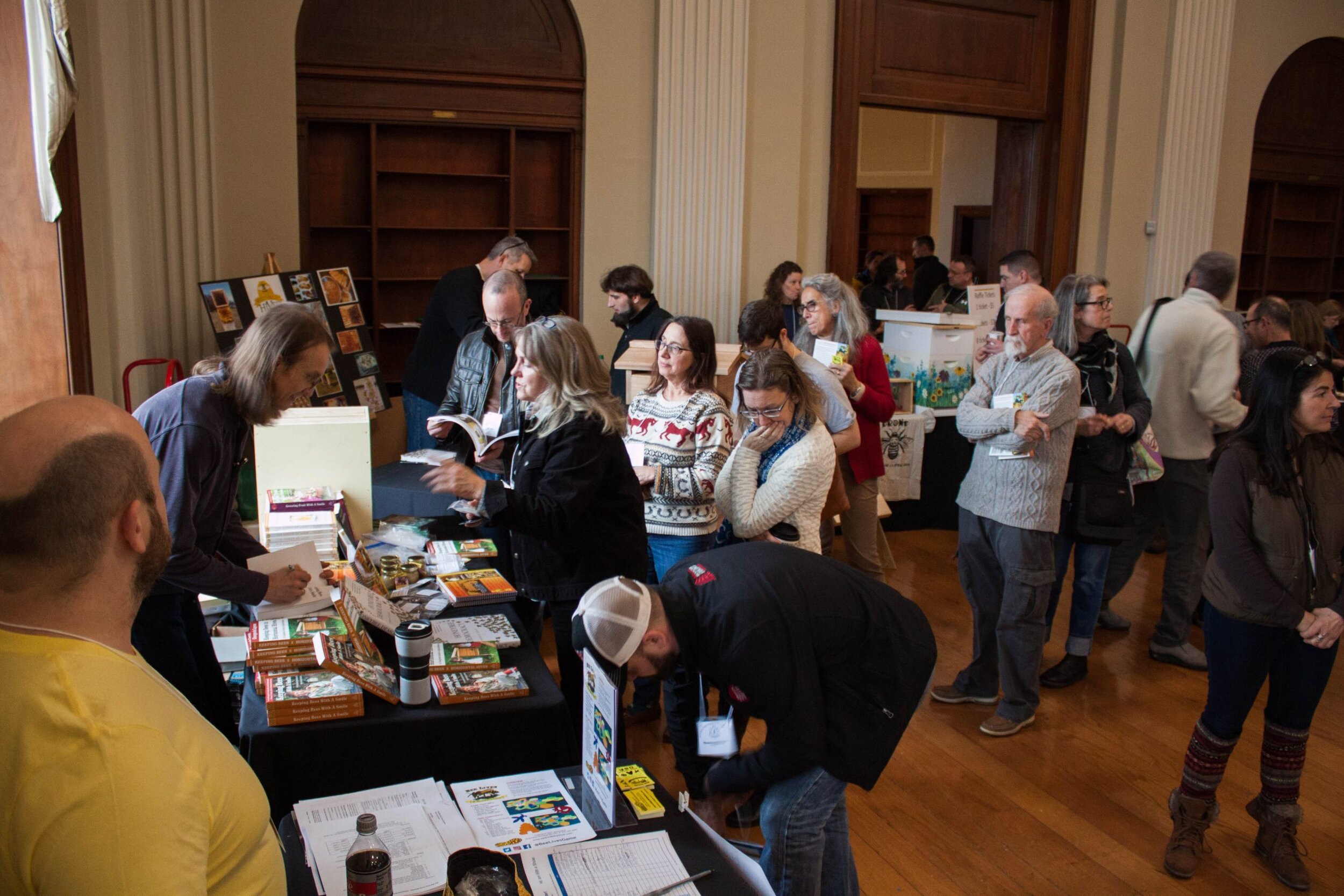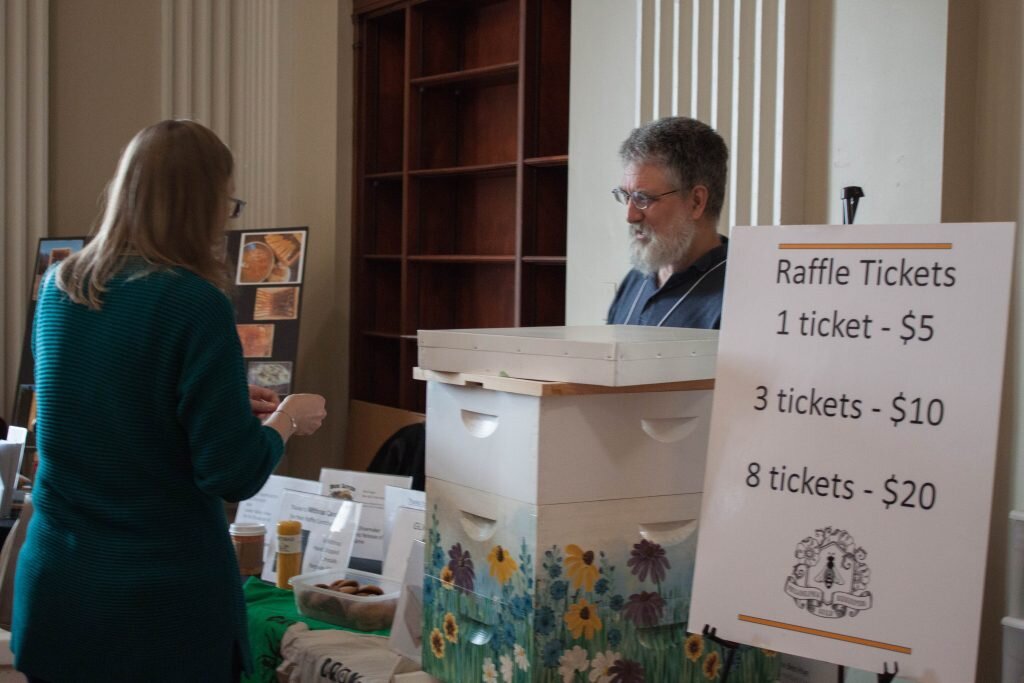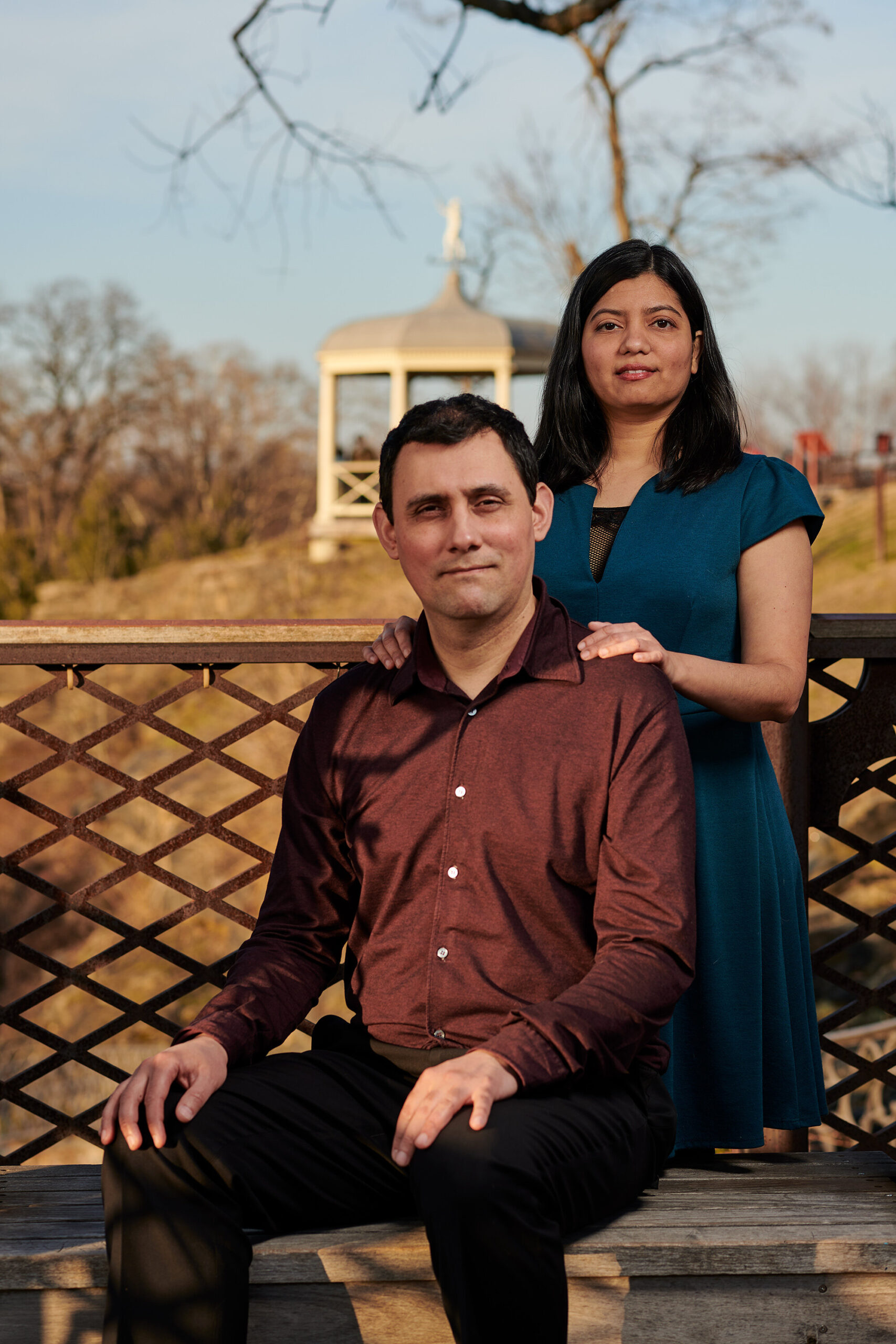Photo courtesy of the Philadelphia Beekeepers Guild
By Francesca Furey
The Philadelphia Beekeepers Guild is rounding up some of the nation’s best urban beekeepers to dive into the relationship of bees and metropolitan areas for their 10th Annual Philadelphia Beekeeper Symposium. Held at the Franklin Institute from 8 a.m. to 5 p.m. on Saturday, the symposium will cover the comparisons of urban and rural beekeeping, socioeconomic factors affecting city bees and more.
Grid spoke with Guild board member Kathy May about everything and anything bees.
May, who proudly identifies as an East Coaster by nature, moved to Philadelphia six years ago after her retirement. While living in Long Island, a friend used her backyard for beekeeping — propelling May to look into beekeeping herself. Once her bags were unpacked in Philly, she hit the ground running and joined the Guild. For the last four years, May’s two beehives have thrived in her backyard and she’s orchestrated various events as the lead organizer of the Honey Fest & Public Events Committee.
This Q&A has been edited for clarity and length.
Kathy, over the years you’ve learned the ins and outs of beekeeping and the Guild. Can you clue us in about the Philadelphia Beekeeper Guild? What’s the organization’s main mission?
The Guild’s mission specifically is twofold. One is to support and help urban beekeepers, through mostly education. The second part of our mission is to raise awareness around the importance of the honeybee in our lives and in our environment, specifically here in Philadelphia. The regular, monthly meetings we have take care of networking, camaraderie, ongoing education for existing beekeepers and if new folks want to stop by.
For the last three years, we’ve had a partnership with Awbury Arboretum in Germantown. In their agricultural village, we have an apiary. We use that for teaching and our educational events. We have quite a gamut of offerings, from two-hour overview sessions to introduction to beekeeping to more advanced programs. We offer various workshops throughout the beekeeping season touching on different topics appropriate to the time, as each beekeeping season requires specific care. We also have a kind-of-sort-of mentorship program where people are matched up with a veteran beekeeper. The person is expected to learn independently while having access to a veteran beekeeper who’ll meet with them on a regular basis to help them get their feet on the ground.
Obviously, Philadelphia is an urban setting. Arguably, most Philadelphians wouldn’t know that a group of people considered themselves to be urban beekeepers. Can you elaborate on urban beekeeping?
Urban beekeeping is really just keeping bees in the city. While there are some nuance differences between keeping bees in an urban environment versus keeping bees out in a rural environment, it’s still the same life cycle. We’re closer together here in the city. Beekeepers have to be more cognizant of the fact that other beekeepers are close to you. How well you keep your bees impacts those around you. Bees fly up to three miles in search of pollen and nectar, so, everybody’s bees get mixed together. At the end of the day, they all come home to the right hive. It’s important for each beekeeper to keep their bees healthy, so when they’re out there mixing around with other bees they’re representing themselves well. If you’re out in the country, and there’s nothing around you, it’s not as concerning.
Here’s a good analogy: people, if you live in the city you have to make sure your dog’s not barking at five in the morning and keep the music down so you don’t wake the neighbors. Whereas if you’re out in the country and you got nobody close to you, hey, who cares? It’s the same thing with beekeeping; you need to make sure your bees are appropriately taken care of and that you’re cognizant of the fact that there’s other beehives near you, and that there are people near you who may not fully appreciate or understand that honeybees are a wonderful thing.
Photo courtesy of the Philadelphia Beekeepers Guild
The 10th annual Philadelphia Beekeeping Symposium is coming up. Would you say urban beekeeping is on the rise over the last decade?
Urban beekeeping is just a natural flow. We continue to see significant numbers of people attend our Introduction to Beekeeping class. Even if you factor that some people go through it and by the end of the day say “I’m not really going to do this,” it would be easily safe to say that at least 100 people a year go into beekeeping in Philadelphia. That’s probably a really low-ball number. A piece of what the Guild tries to do is to paint a realistic picture of what this means: a lot of people are enamored with the idea of keeping bees, but you need to remember that it’s like keeping livestock. We have to be good stewards of all of that — you can’t just throw a bunch of bees in a box in your backyard and think you’re a beekeeper.
The Guild has a ton of speakers from various urban settings, like Detroit, New York City, and Washington D.C. How are speakers chosen?
When you get into the beekeeping world, you find out there’s famous beekeepers — who knew. Folks that have been in the business for a long time are commercial beekeepers and have done a lot of research. They almost become scientists. One year we had speakers from the Minnesota Bee Lab, which is famous in the U.S. for the research they’re doing on honeybees. Now those speakers are flying all around the world doing additional research on bees and have made a number of breakthroughs on bee science. This year, we just kind of decided: well, we’re urban, so let’s network with other cities! We share a lot in common with major metropolitan areas, like New York, Detroit, and Washington D.C. We want to hear from them and see what their take is from their city’s point of view.
Let’s talk trends: As you know, different forms of sustainable and environmental activities have been trendy, especially with the constant flow of news and climate change coverage. When it comes to beekeeping, is it a permanent hobby? Do people stick with it?
Once people get into it, the majority stay with us. It’s not 100%. But, I think once a beekeeper, always a beekeeper. Even if they don’t keep bees down the road, people are advocates for the environment, bees and natural pollinators. They’re definitely descendants of the environment. I don’t believe a beekeeper ever loses their desire to do right by the environment. Most of the people in Philadelphia, with the exception of a few folks, are all hobbyists, like myself.
By and large, at least in Philadelphia, we’re all hobbyists. To my knowledge, about four or five folks in Philadelphia make their living from keeping bees, removing swarms, selling honey, breeding bees and selling bees. It’s kind of a second gig for some folks. But, the big beekeepers who have hundreds of hives are in other counties over in New Jersey or Pennsylvania.
Philadelphians, or even Pennsylvanians, might not know that bees have such a large role in the environment, whether it be urban, suburban, or rural. Why do you think that is?
You know, God bless. I could give you the snarky answer: it’s the same reason somebody doesn’t know who their senator is. In the six years I’ve been doing some of our outreach and events, I’ve seen more of an awareness. But, you still meet a few people who don’t know that over a third of the food on their plate wouldn’t be there if it weren’t a honey bee in pollination. A lot of the schools are getting more into it. There’s just been a lot of chatter about it on many levels. With a lot of misinformation, everyone reads things differently. Hey – at least they know bees are important and that bees are dying. They might have a bunch of other facts wrong but they know bees are important.
If a Philadelphian or a Grid reader wanted to take up urban beekeeping, where would they start? Is a specific ecosystem or preparation required?
You just can’t become a beekeeper overnight. The important thing to know is that Philadelphia is a bee-friendly city. Four years ago, the mayor declared Philadelphia a bee-friendly city. We are required by the state of Pennsylvania to register our hives but it’s not a big deal. You do it online and it costs you $10 for two years. You get access to the the resources of the state apiaries and good information, too. But, there is an investment. We’d recommend everyone take a class whether it’s with the Philadelphia Beekeepers Guild or other associations.
You got to plan ahead and get your suit, your smoker and a few tools. The Guild recommends you start with two beehives. If you buy all proper equipment and take the necessary precautions, you need to be prepared to spend about $1500. Our meetings are free and open to the public. We meet at St. James School in East Falls once a month. People are more than welcome to come listen, ask questions, meet beekeepers and get a handle on whether or not this is something they want to do before they jump in with both feet.










